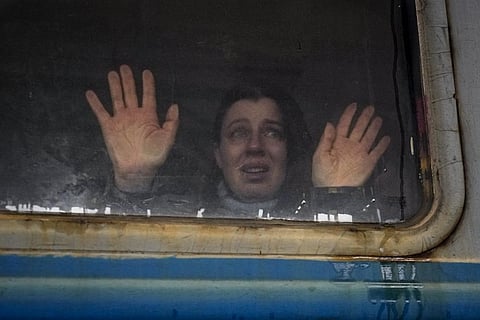

GENEVA: The United Nations Human Rights Council on Thursday launched an urgent debate on the situation of human rights in Ukraine stemming from Russian aggression.
Michelle Bachelet, United Nations High Commissioner for Human Rights, said the Russian Federation's military attack on Ukraine had opened a new and dangerous chapter in world history. The attack that began on February 24 was generating a massive impact on the human rights of millions of people across Ukraine. Elevated threat levels for nuclear weapons underlined the gravity of the risks to all of humanity. Over two million people had been forced to flee their homes. Tens of millions of people remained in Ukraine, in potentially mortal danger. There should be an immediate resolution of the conflict through peaceful means, she said.
In her opening statements, Michelle Bachelet noted that Military operations were escalating further as they spoke, with military strikes on and near large cities. By Tuesday night, her Office had recorded and confirmed 752 civilian casualties, including 227 killed – 15 of them children. At least 525 had been injured, including 28 children. The High Commissioner emphasised that the real figures would be far higher, since numerous other casualties were pending confirmation, and information from some areas engaged in intense hostilities had been delayed.
Victor Madrigal-Borloz, Chair of the Special Procedures' Coordinating Committee, urged the Russian Federation to observe and respect international law; end hostilities immediately and unconditionally; stop immediately all human rights violations stemming from the attack; facilitate the immediate and unhindered delivery of humanitarian assistance; and restore the ability of the people in Ukraine to exercise their human rights and fundamental freedoms without military or external interference.
Gennady Gatilov, Permanent Representative of the Russian Federation to the United Nations Office at Geneva, speaking as a country concerned, said the situation in Ukraine had been before the Council since 2014. At that time, a regime had come to power in Kyiv after an anti-constitutional coup that began to virtually exterminate the Russian-speaking population of the country. The Human Rights Council had had the opportunity to act on these reports and protect democracy and the people of Ukraine, and preserve a multi-ethnic and multicultural Ukrainian society, but it had failed to do so.
Emine Dzhaparova, First Deputy Minister of Foreign Affairs of Ukraine, speaking as a country concerned, said the Council had gathered today to discuss the existential threat to human rights as a principle, not only caused by the breach of the fundamental principles of international law, but also by the breach of international law by one of the biggest countries of the world, by one of the members of the Security Council, by a weak leader who wished to look strong, who pushed his country into the hell of crime and injustice against Ukraine.
In the ensuing debate, many speakers condemned the Russian military aggression in the strongest possible terms. Some speakers raised the cause of the conflict, saying that it was in part due to the hegemonistic policies of the short-lived governments of the West, including the United States and the European Union. It was not up to the Human Rights Council to discuss the situation, given the hypocrisy displayed by that body, and given the human rights violations committed by the Ukrainian Government over previous years.
The Council will resume its urgent debate on Ukraine at 10 a.m. on Friday, 4 March, to conclude the debate and to take action on a draft resolution.
ALSO WATCH |
On Wednesday, the U.N. General Assembly voted Wednesday to reprimand Russia over its invasion of Ukraine and demand that Moscow stop fighting and withdraw its military forces.
The General Assembly voted 141-5, with 35 countries abstaining, for the draft resolution, Aggression against Ukraine, which was co-sponsored by 94 countries. Only five nations voted against the measure: Russia, Belarus, Syria, North Korea and Eritrea.
According to reports, on Tuesday, over 100 diplomats from countries worldwide walked out just as Russia’s foreign minister Sergey Lavrov was set to address the United Nations Human Rights Council session via video from Moscow. Ukrainian ambassador to UN Yevheniia Filipenko led the boycott.